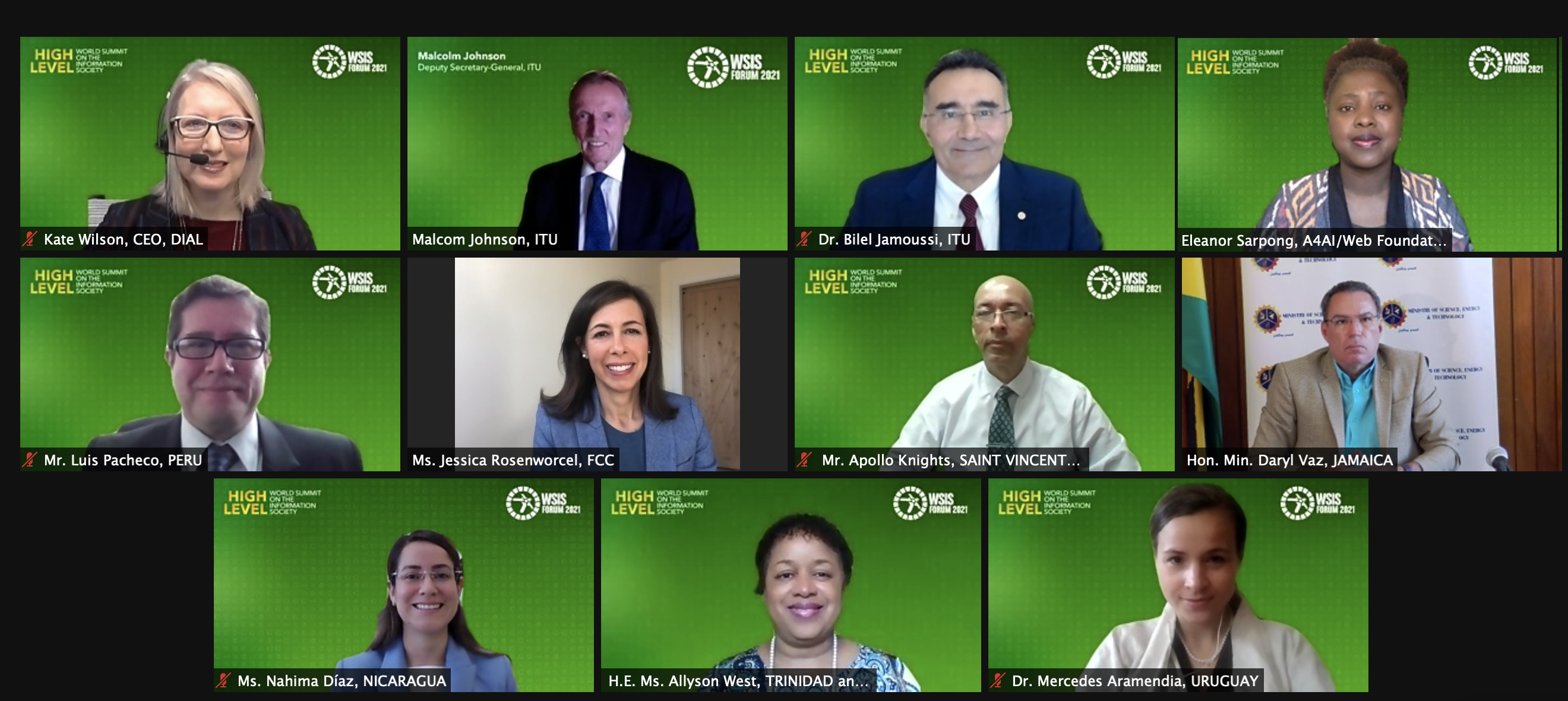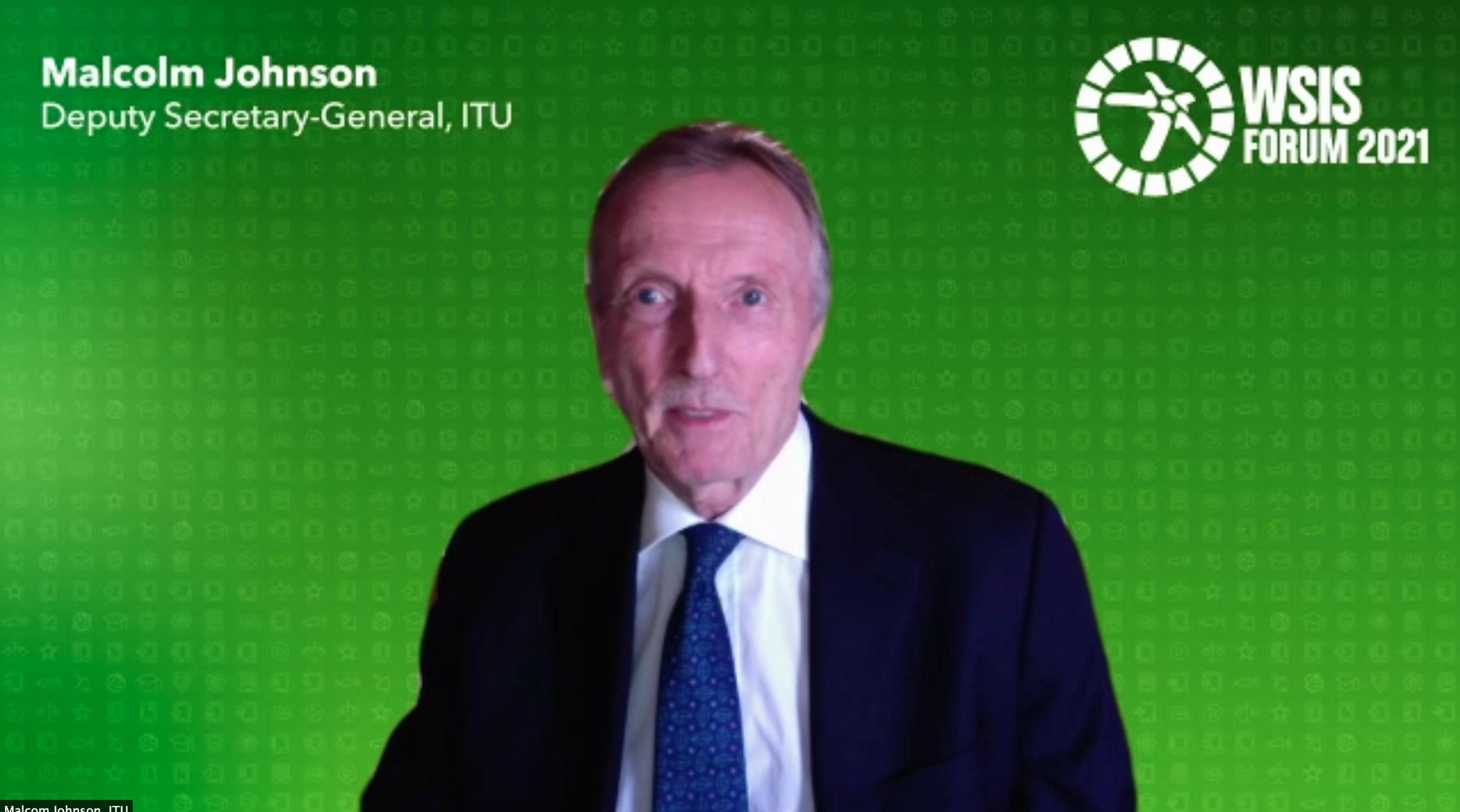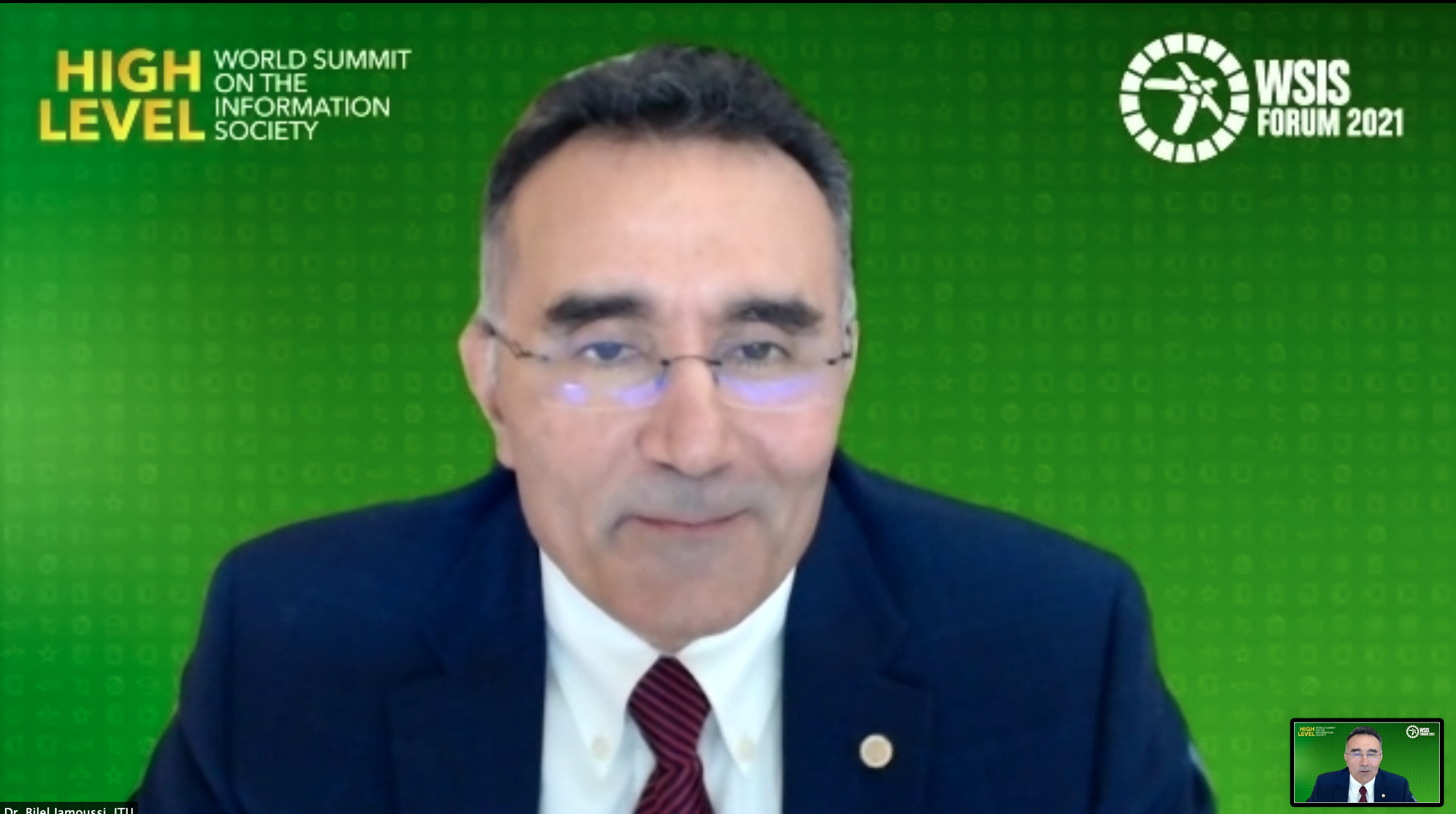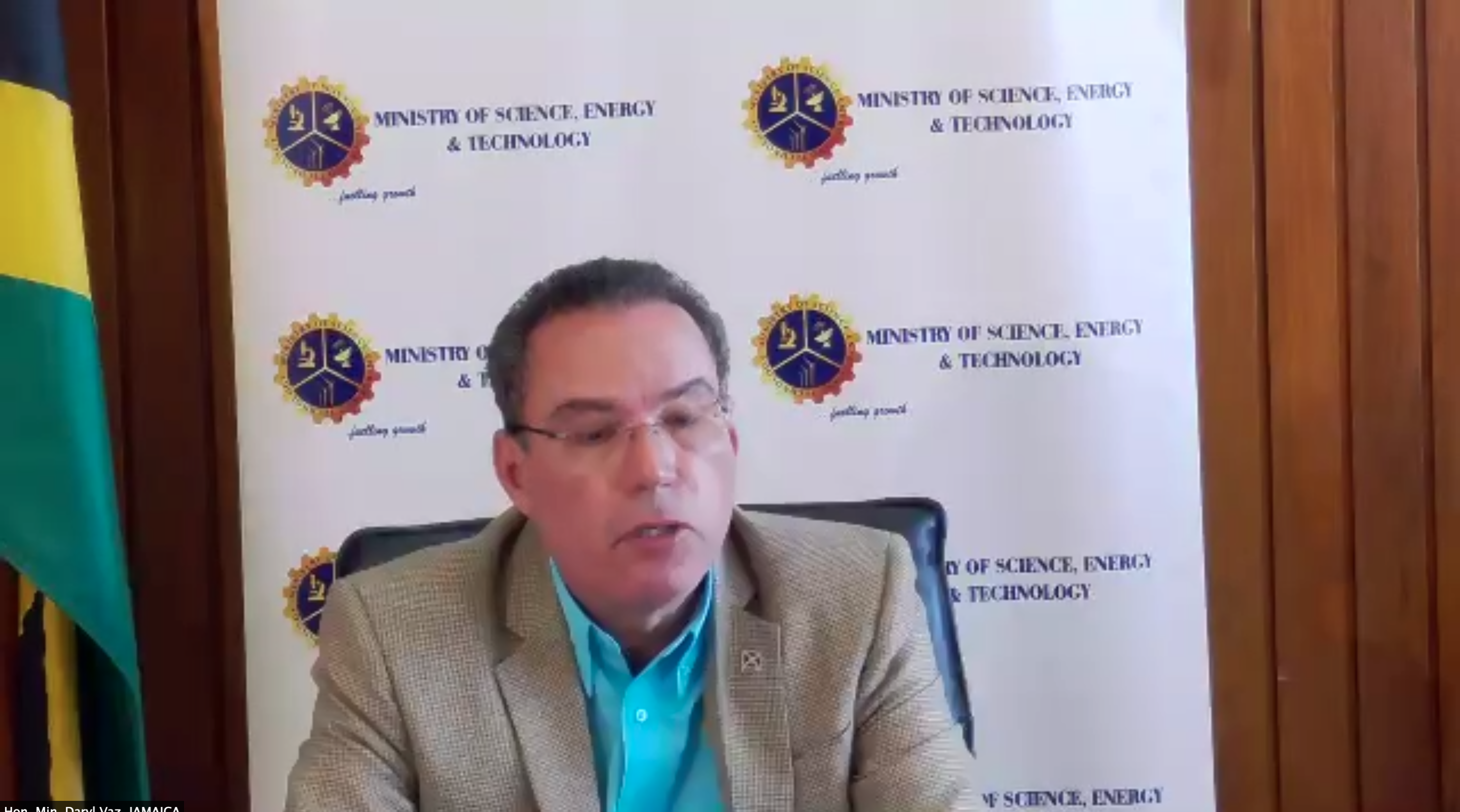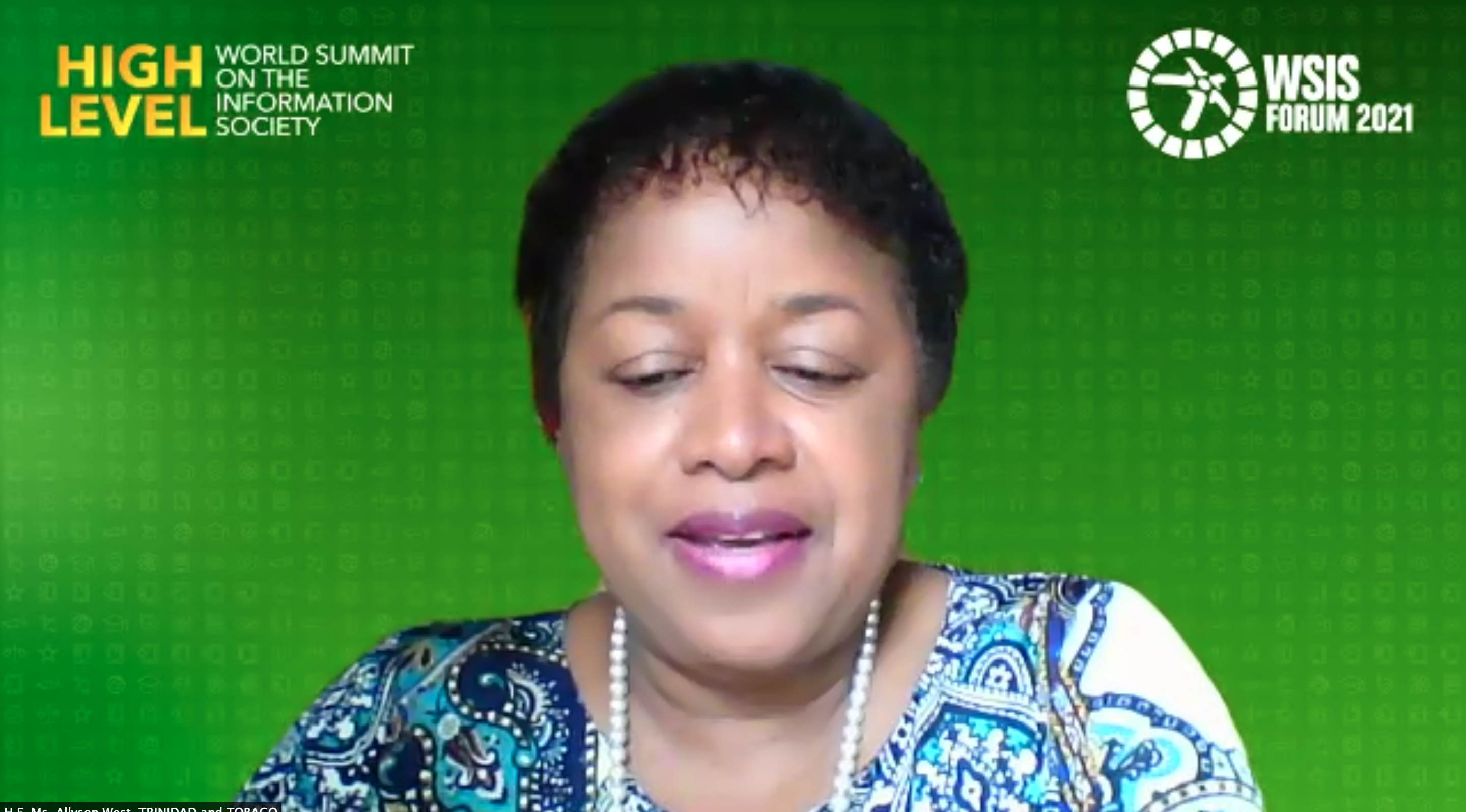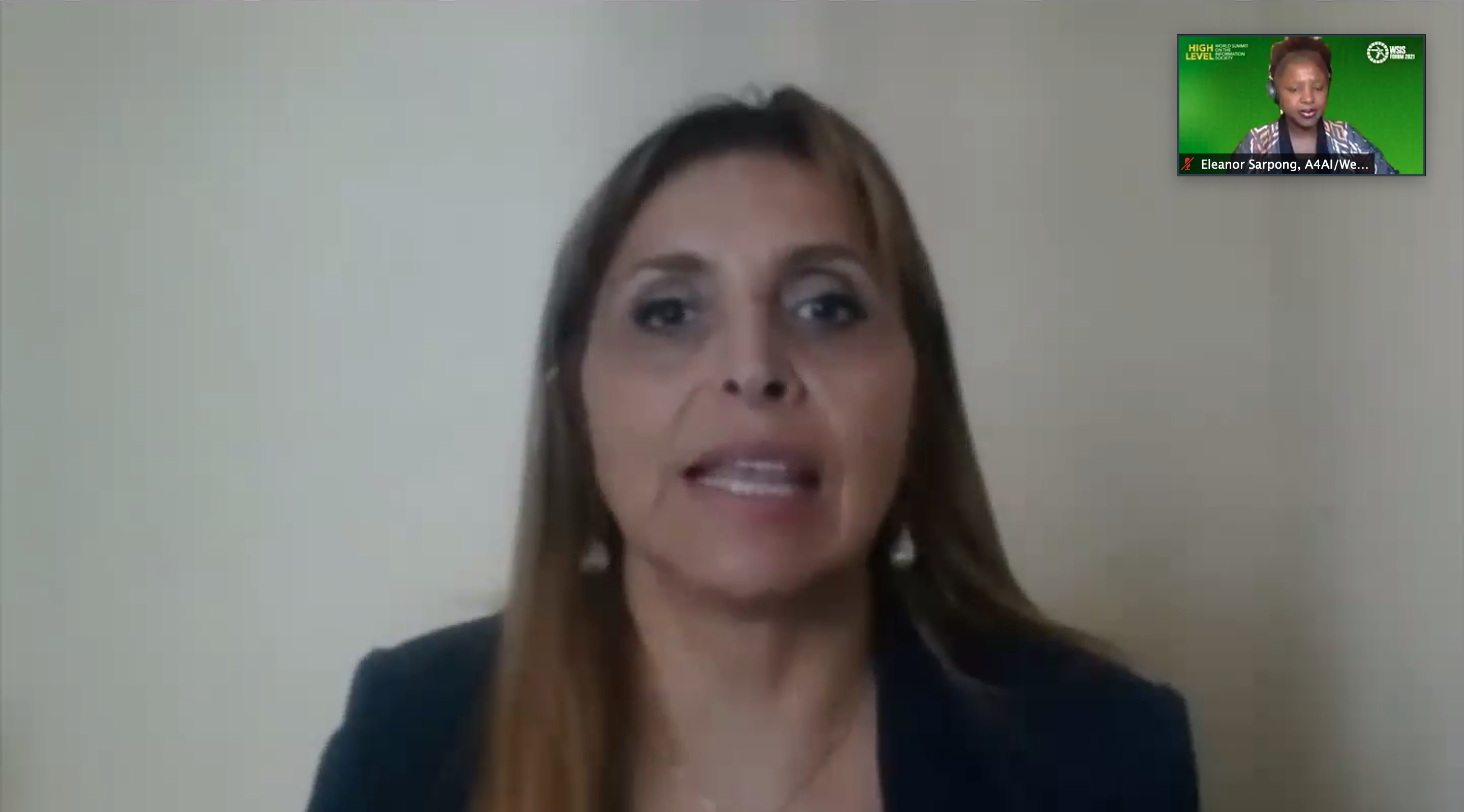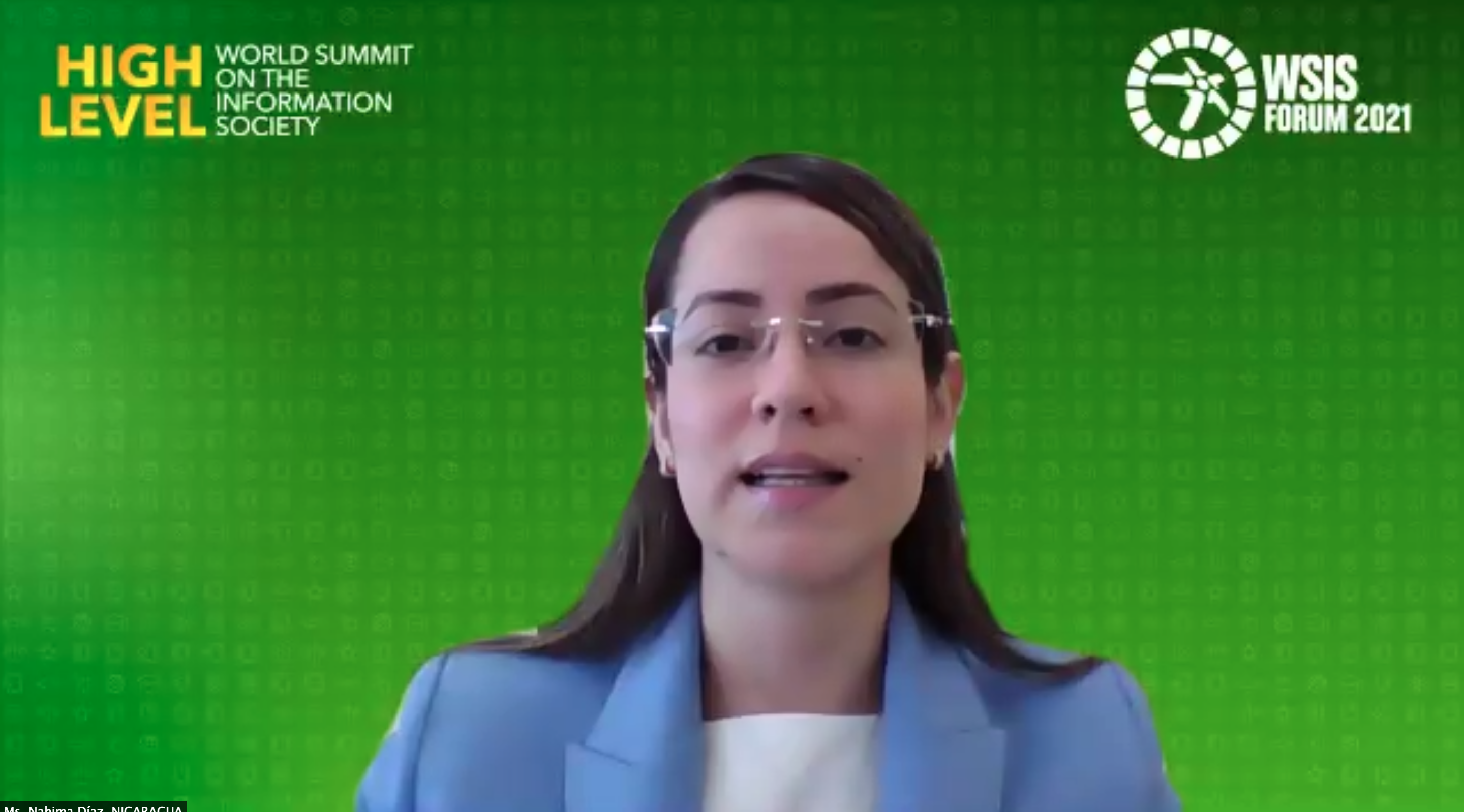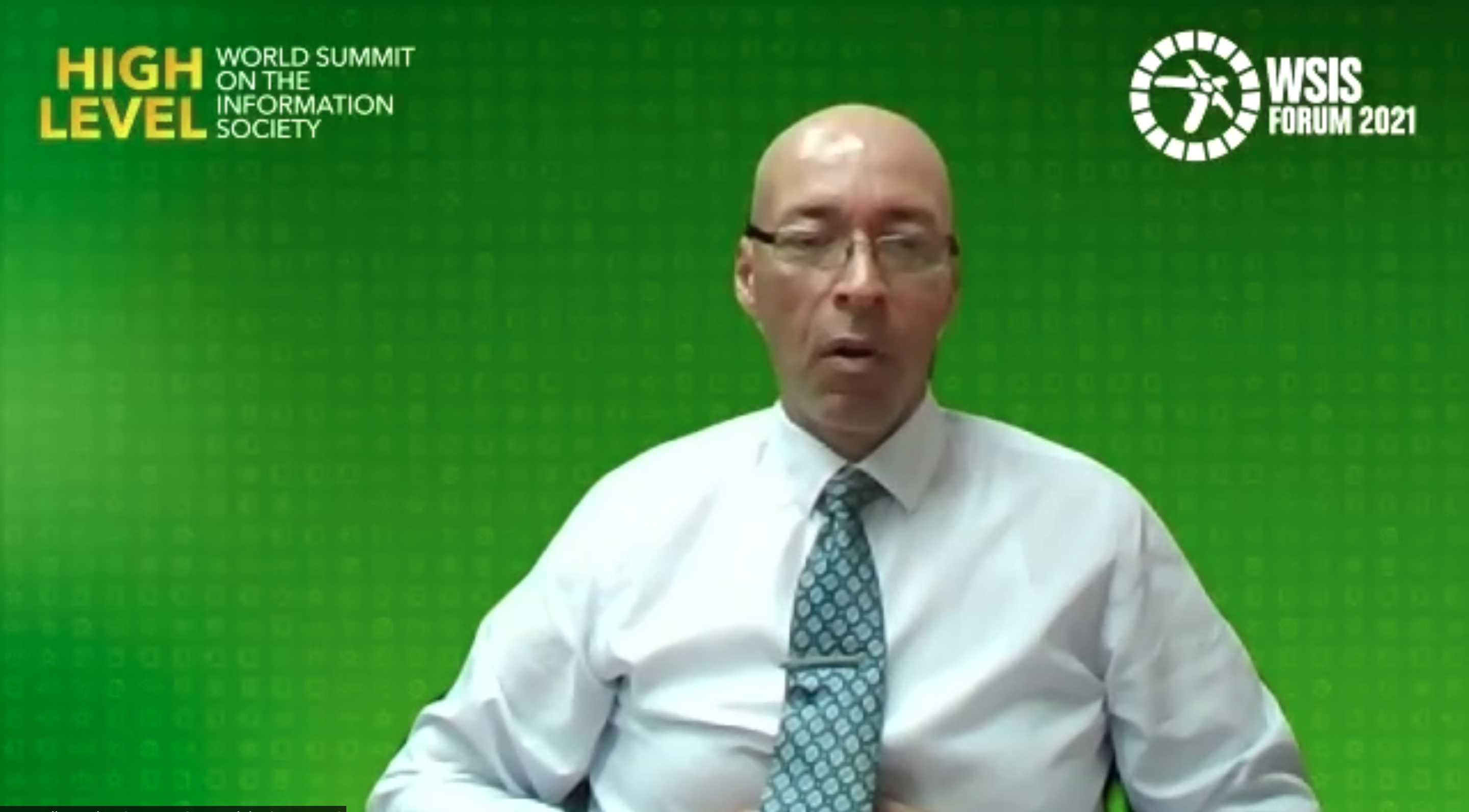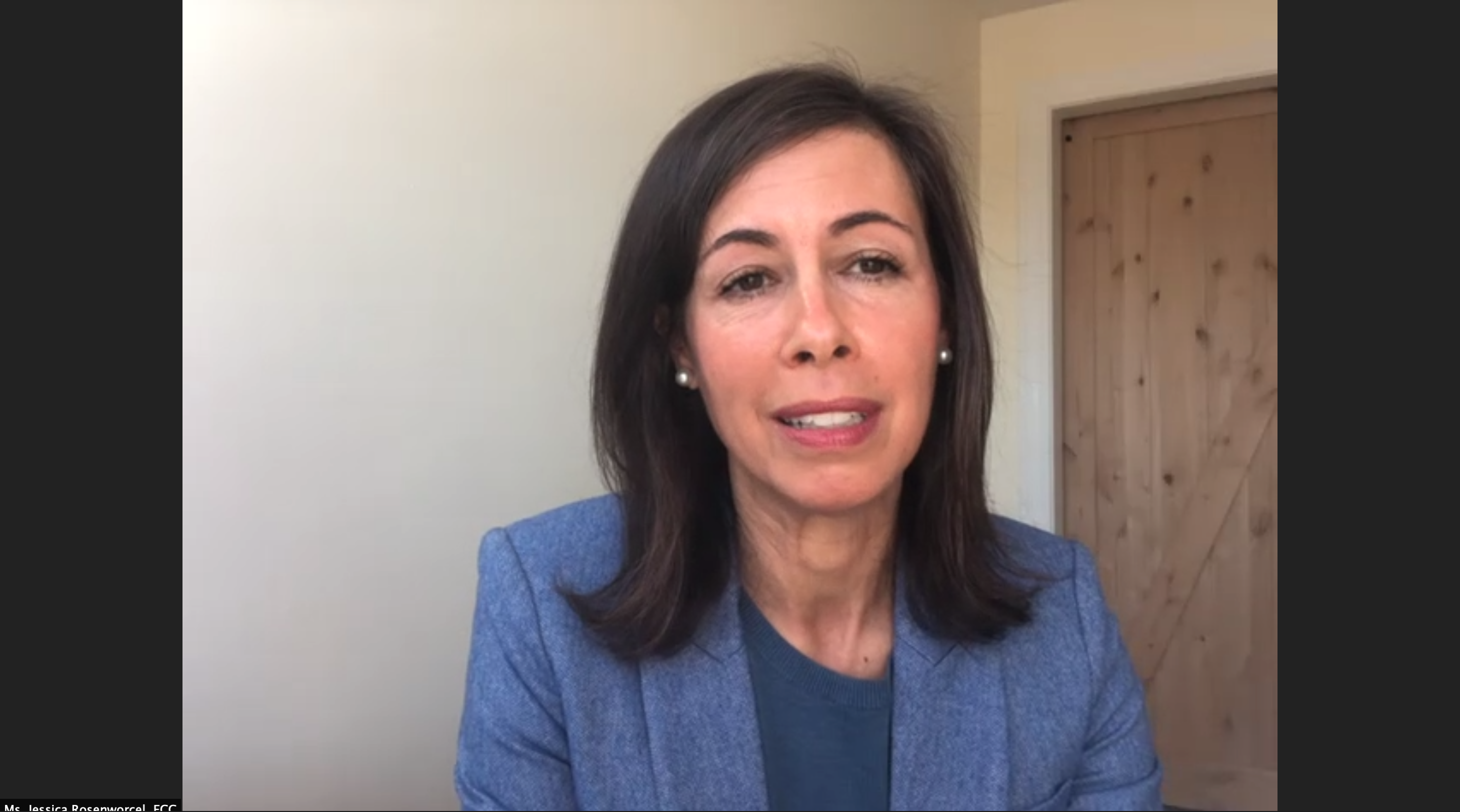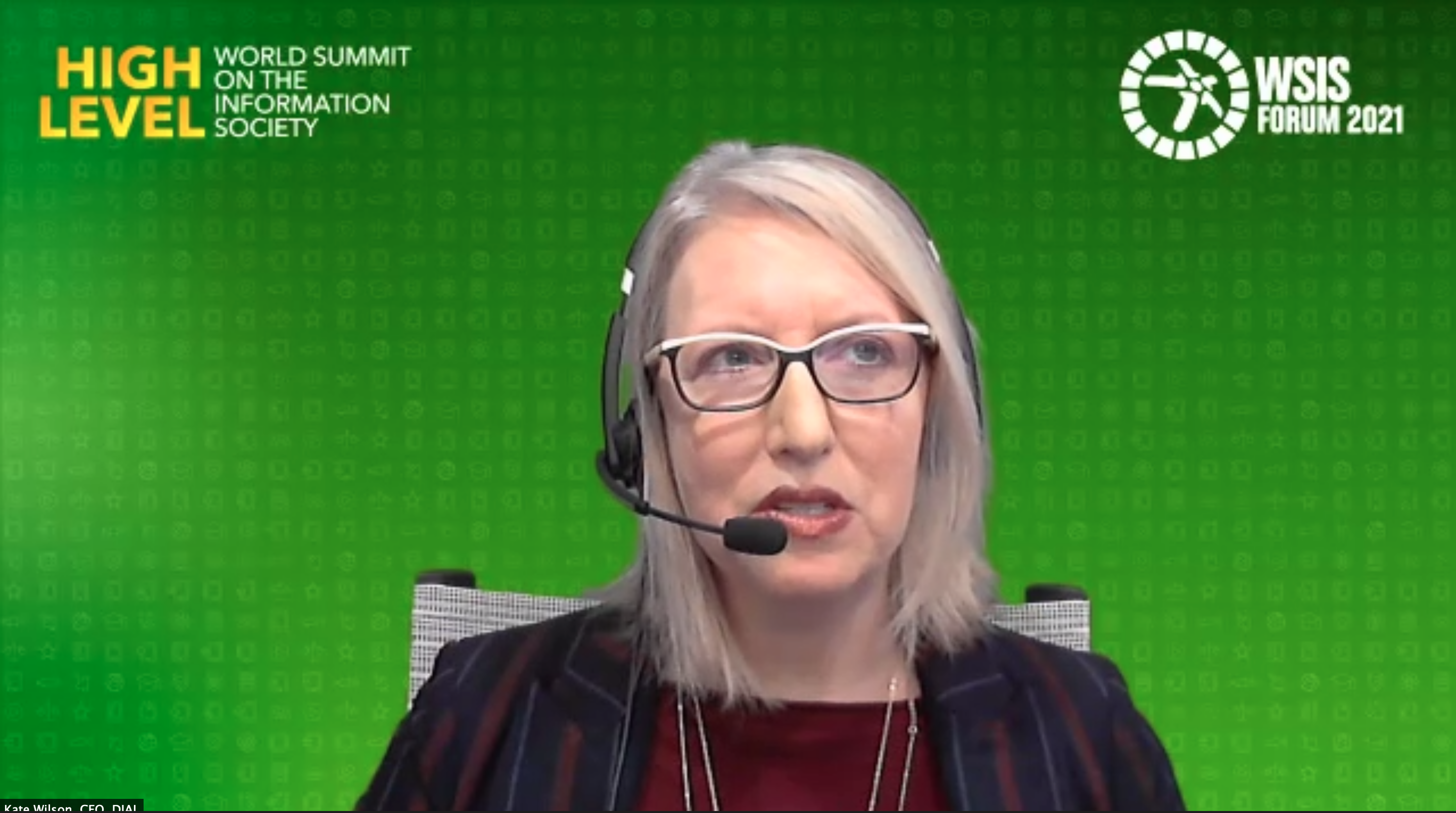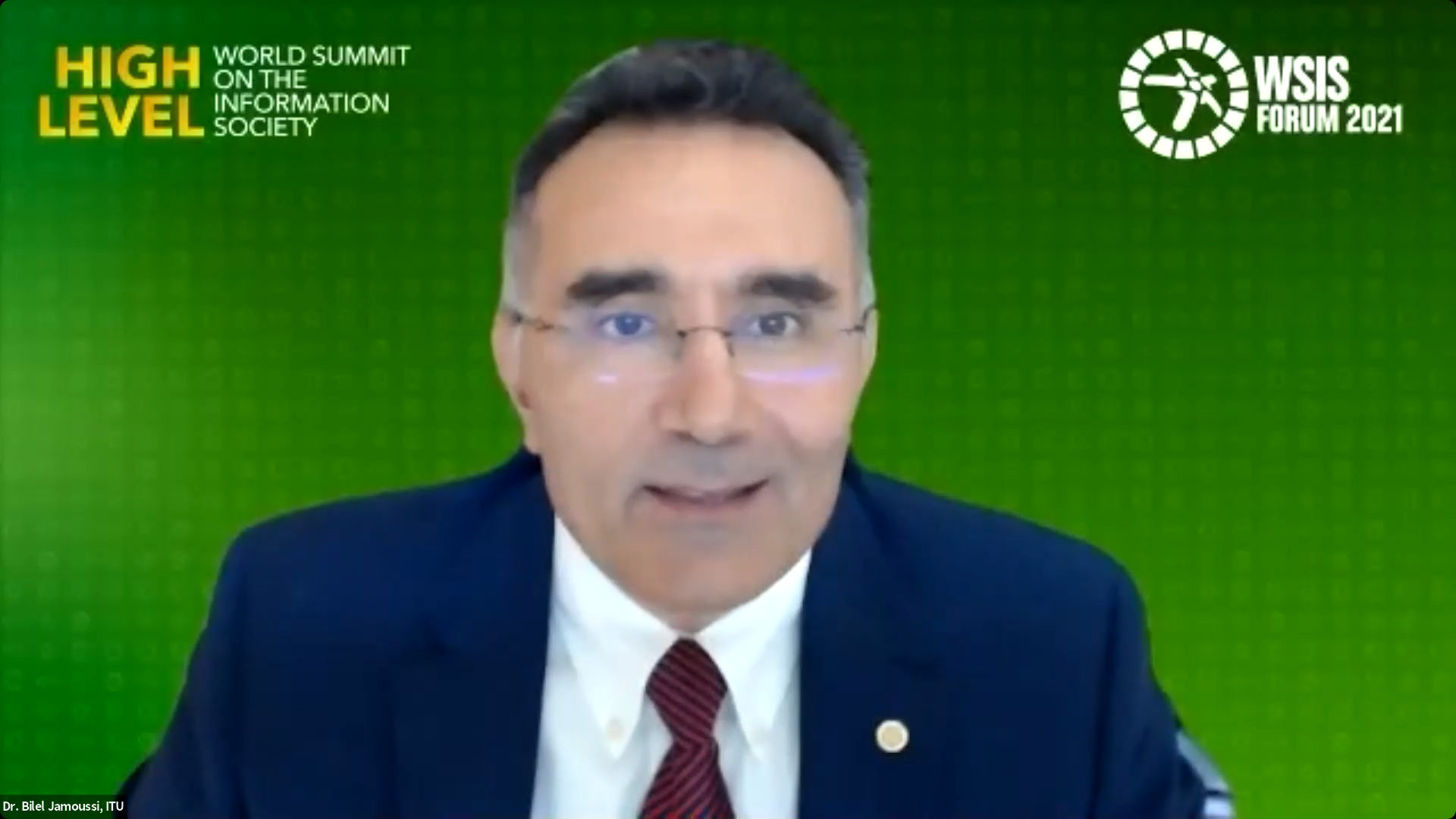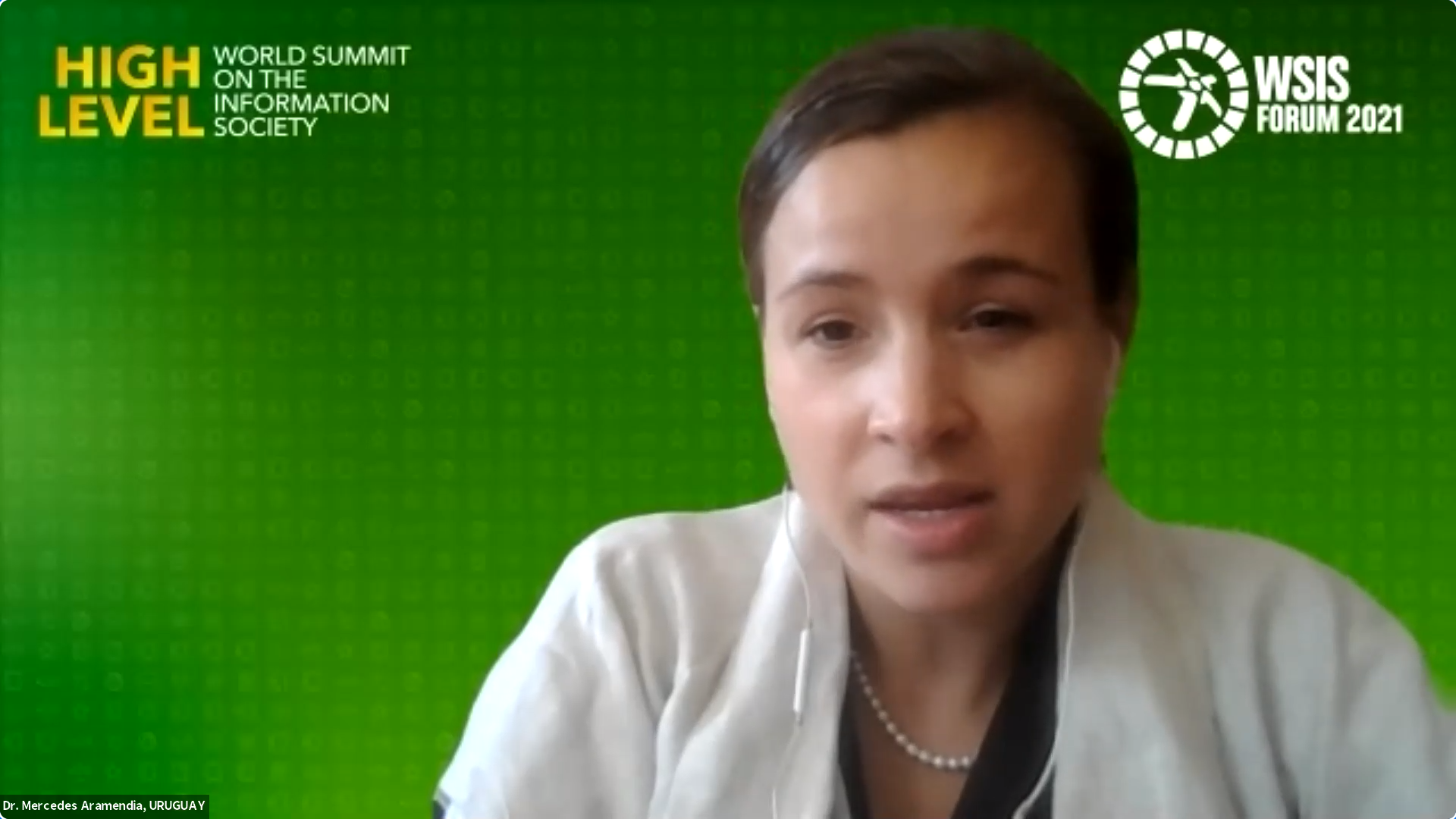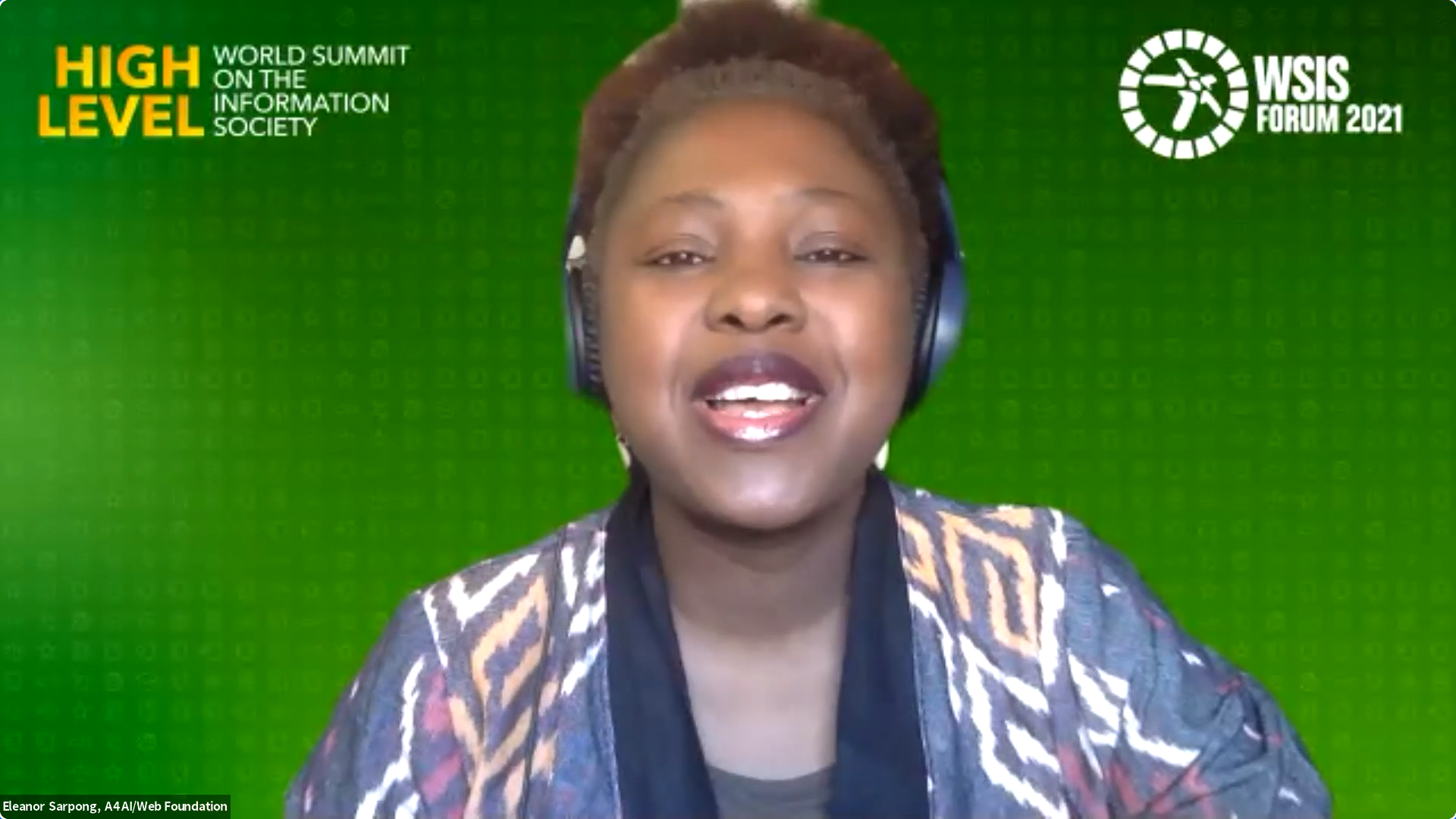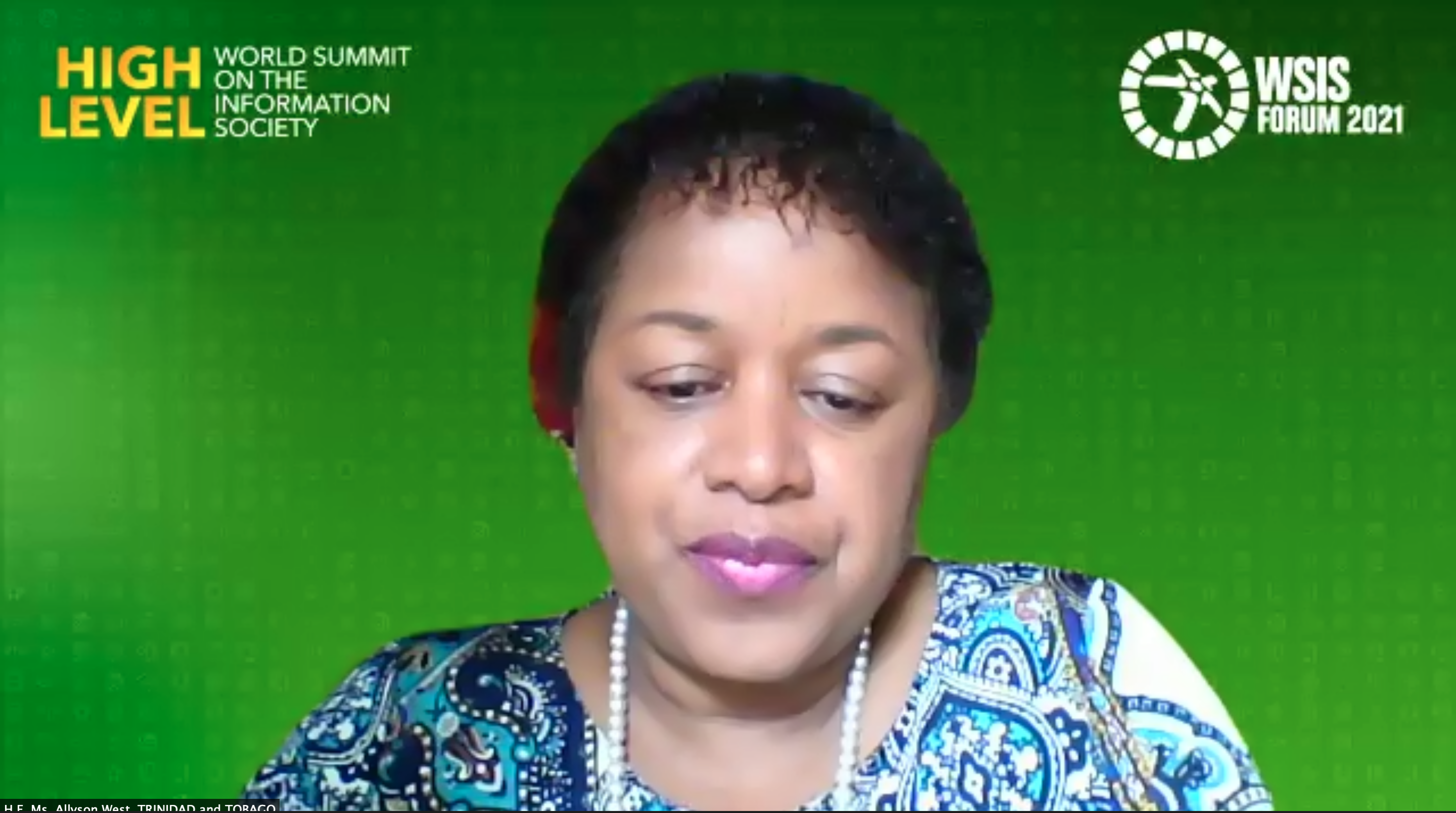High-Level Policy Session 2 : Bridging Digital Divides
WSIS
Session 154
About half the world's people access and use the Internet. The other half do not. Many of the unconnected live in least developed countries, landlocked developing countries and small island developing states. Globally, over 1 billion new internet users have been added over the last 4 years, however substantial digital divides persist between more and less connected countries, communities, and people. Enabling all the world ́s people to access and use the Internet—and removing digital divides—remains a challenge that needs to be addressed if the world community is to achieve the United Nations Sustainable Development Goals (SDGs) by 2030. [1]
[1] Digital inclusion of all: //1f8a81b9b0707b63-19211.webchannel-proxy.scarabresearch.com/en/mediacentre/backgrounders/Pages/digital-inclusion-of-all.aspx
We are also fully aware that the benefits of the information technology revolution are today unevenly distributed between the developed and developing countries and within societies. We are fully committed to turning this digital divide into a digital opportunity for all, particularly for those who risk being left behind and being further arginalized. //1f8a81b9b0707b63-19211.webchannel-proxy.scarabresearch.com/net/wsis/docs/geneva/official/dop.html
First Phase of the WSIS (10-12 December 2003, Geneva) Geneva Declaration of Principles
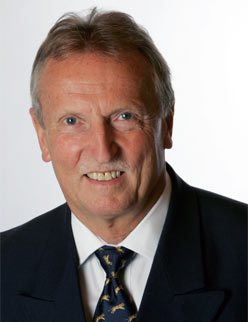
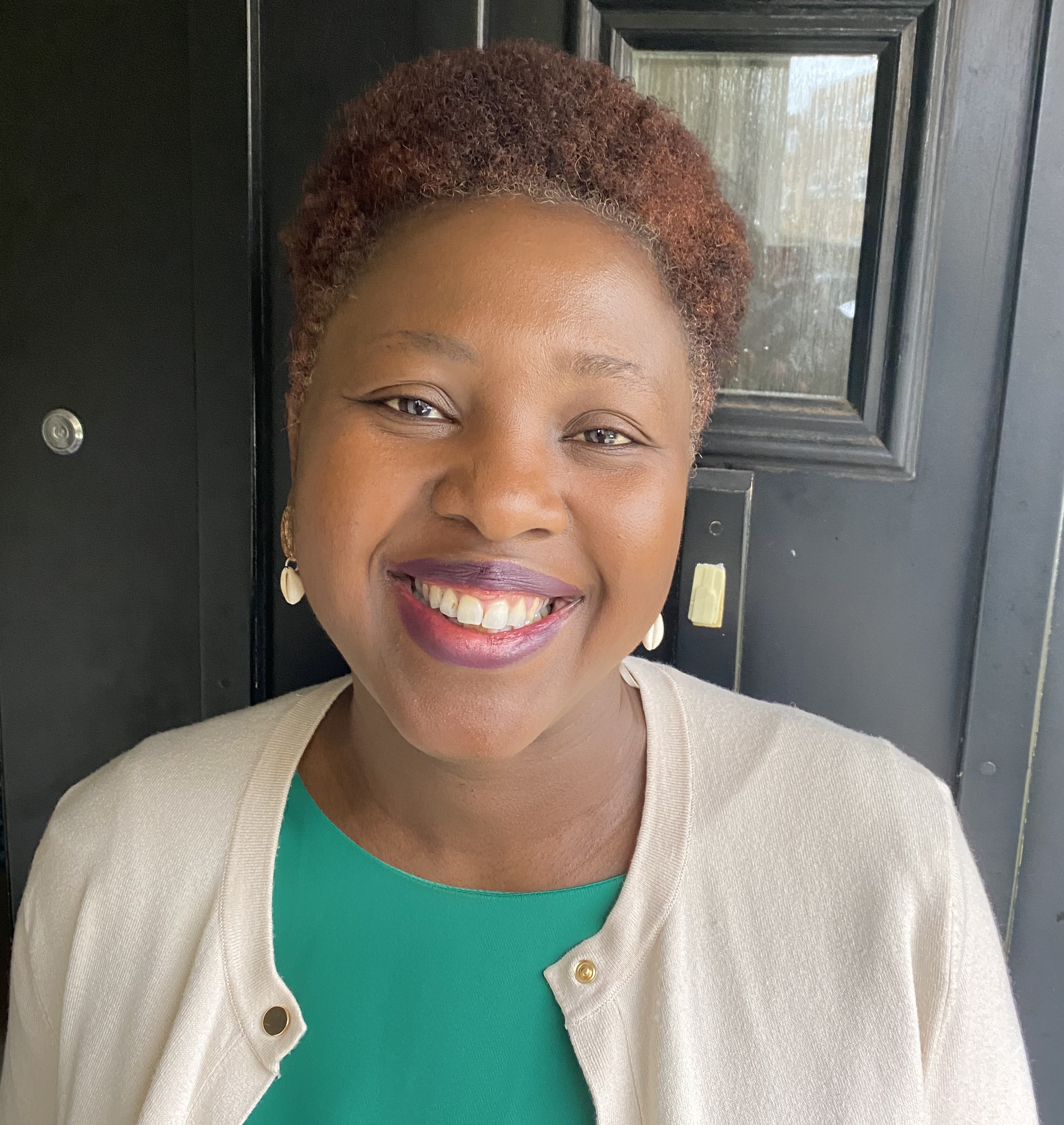
Eleanor is A4AI’s Deputy Director and Policy Lead. She leads policy and advocacy efforts with particular oversight on all A4AI’s country engagement work in Asia, Africa, and Latin America. A public policy expert with 19-year multidisciplinary experience in the private, public and not-for-profit sectors, her expertise includes ICT regulation, taxation, access, connectivity, universal service and data protection. Eleanor is an alum of the Harvard Kennedy School Executive Education Program, and holds an MBA from the Warwick Business School.
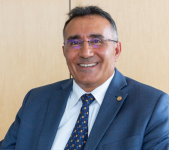
Dr. Bilel Jamoussi is Chief of the Study Groups Department at the International Telecommunication Union Standardization Bureau in Geneva Switzerland where he is responsible for the organization and management of the ITU-T Study Groups, Focus Groups, Global Standardization Initiatives, Joint Coordination Activities, and their secretariat.
Bilel is an IEEE Senior Member. He was elected to the IEEE Standards Association (IEEE-SA) Board of Governors (BOG) and the IEEE-SA Corporate Advisory Group (CAG). He served on the IEEE Standards Education Committee, the IEEE-SA Nominations and Appointments Committee, the IEEE-SA BOG International ad hoc, and the Technical Liaison from IEEE-SA to ITU-T and ITU-D.

The Honourable Daryl Vaz, MP was sworn in as Minister of Science, Energy and Technology on September 13, 2020.
The major priorities of this Administration for the Ministry are the creation of an enabling environment to facilitate access to alternative sources of energy, greater incorporation of science and innovation as well as ensuring universal access to broadband and wireless services as a right for all Jamaicans, with a specific focus on rural Jamaica.
Prior to his appointment to the Ministry, Minister Vaz was the Minister without Portfolio in the Ministry of Economic Growth and Job Creation with responsibility for the Land, Environment, Climate Change & Investment portfolios. Minister Vaz was then assigned the Water and Housing portfolios and subject matters having to do with certain special economic development projects.
He was tasked with ensuring that water and housing projects are accelerated and that special economic projects, such as the Special Economic Zones come to fruition.
Minister Vaz has served Jamaica in several capacities. He is a former Minister without Portfolio in the Office of the Prime Minister with responsibility for Information and Telecommunications. He also served as a former Minister of State in the Office of the Prime Minister with responsibility for Project Implementation and Service Delivery.
He was an Opposition Spokesman on Land and the Environment as well as ICT and Digital Society Development.

Senator the Honourable Allyson West was appointed Minister of Public Administration and Digital Transformation on August 19, 2020. Immediately prior, she was the Minister of Public Administration from August 14, 2019, as well as, the Minister in the Ministry of Finance from June 30 2017. In her current capacity, Senator West is responsible for leading the transformation of Trinidad and Tobago to becoming a digital nation, including transforming the public service to becoming a digital government.
Senator West is a senior member of the Law Association of T&T, registered to practice law in T&T.
Prior to public appointments in 2019, Senator West was a Partner and Territory Tax Leader in the Tax and Corporate Services Department of PricewaterhouseCoopers (PWC), Trinidad and Tobago (T&T).
Senator West however, previously worked in the public service; she served as a Senior State Counsel at the Board of Inland Revenue (BIR) from 1986 – 1994 and was responsible for advising the BIR on taxation, legal and regulatory issues. She has also represented the BIR in numerous tax appeals and various other matters before the Courts of Trinidad and Tobago. She continues to be a member of T&T’s Permanent Double Taxation and Negotiating Teams for the conclusion of Double Taxation Treaties and represented the Government of T&T and the Board of Inland Revenue in contract negotiations and at numerous regional and international conferences.
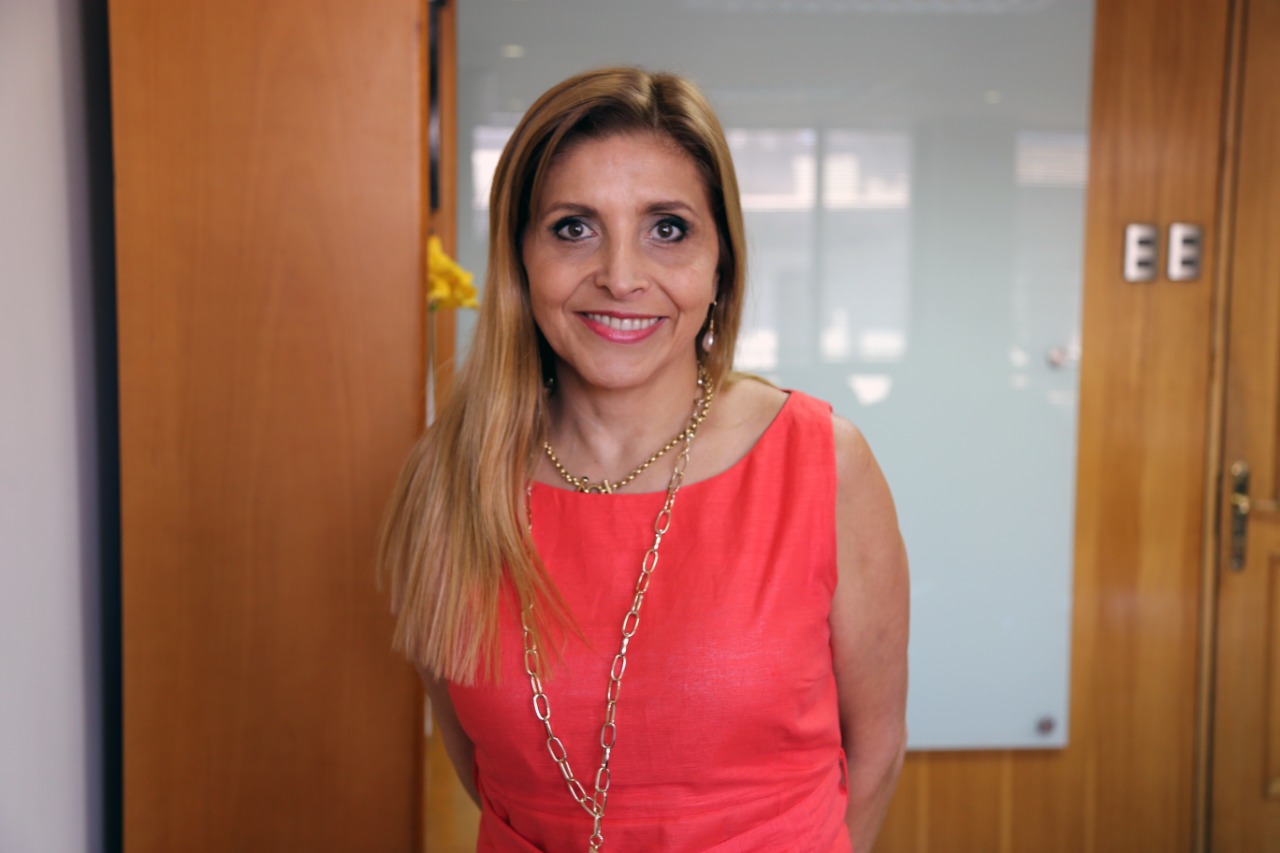
Pamela Gidi Masías is a Business Manager from the Catholic University of Chile and MBA of the University of California Los Angeles (UCLA) and the London Business School.
Previously to her duties as Vice Minister, she worked as Development and New Platforms Manager in the National Television of Chile.
Also, she worked for 8 years on DirecTV: first in Chile as Marketing, Products and Public Affairs Director. After that she was promoted as Vice President of DirecTV Latin America in New York.
She has 25 years of solid experience in executive positions in multinational companies such as Unilever, HASBRO, Ford Motor Company, J.C. Penny Company and The Walt Disney Company.

Master in Business Administration, focused on Marketing and Finance. General Director of the Nicaraguan Institute of Telecommunications and Correos, responsible for adopting and promoting best practices and public policies in the telecommunications sector and promoting plans, programs and projects that increase and facilitate access to information technologies for our Nicaraguan population.
Nicaraguan Institute of Telecommunications and Postal Services (TELCOR) - Managua, Nicaragua.
- Guarantee the availability of a wide range of efficient telecommunications and postal services in free competition within the national market, seeking the lowest possible cost, and ensuring the quality of the services provided by the different authorized operators.
- Guarantee and promote the extension of telecommunications and postal services in remote communities, rural areas and the Caribbean Coast of the country.
- Promote technological innovation and accelerated modernization of the broadband network.
- Guarantee the opportunity of access and efficient use of the radio-electric spectrum for the provision of telecommunications services.
- Protect the inalienable right of users to access services.
- Participate and stimulate the formation of strategic alliances between regulatory bodies and specialized agencies and training institutions.
- Representing as delegation the President of the Republic, in international meetings before international regional and continental telecommunications organizations and before operators, with the aim of having regulatory standards that guarantee a better development of the telecommunications sector.
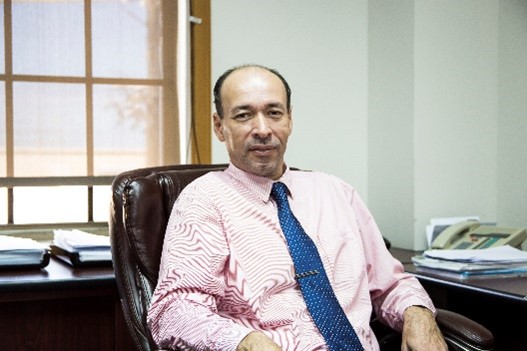
Mr. Knights has spent the last two decades working in the public sector in St. Vincent and the Grenadines and specifically in the area of telecommunications development, regulation and policy. Prior to joining the National Telecommunications Regulatory Commission (NTRC) as its Director in 2002 he was the Telecommunications Officer in the Ministry of Communications and Works and was deeply involved in the telecommunications liberalization process within the Organization of Eastern Caribbean States (OECS).
His expertise covers a wide area including management, emergency communications, numbering, universal service and access, policy development, and digital transformation. Mr. Knights believes in practical solutions to problems and tries to have his work benefit the citizens he serves here at home and the wider Caribbean region. He holds a Bachelor’s Degree in Electrical Engineering, a Master’s Degree in Telecommunications and Networking and an MBA in International Business.
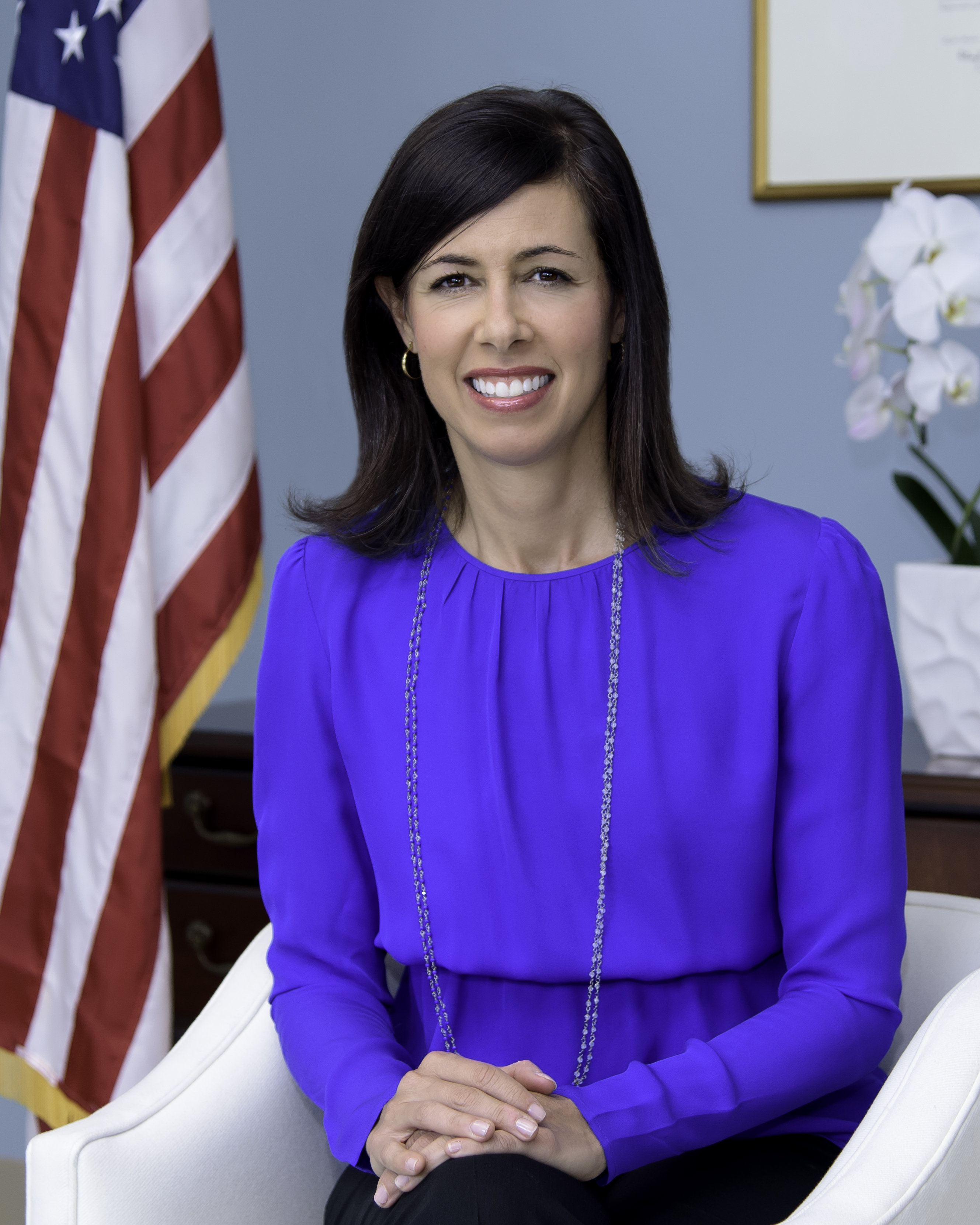
Federal Communications Commission Acting Chairwoman Jessica Rosenworcel believes that the future belongs to the connected. She works to promote greater opportunity, accessibility, and affordability in our communications services in order to ensure that all Americans get a fair shot at 21st century success. She believes strong communications markets can foster economic growth and security, enhance digital age opportunity, and enrich our civic life.
From fighting to protect net neutrality to ensuring access to the internet for students caught in the Homework Gap, Jessica has been a consistent champion for connecting all. She is a leader in spectrum policy, developing new ways to support wireless services from Wi-Fi to video and the internet of things. She also is responsible for developing policies to help expand the reach of broadband to schools, libraries, hospitals, and households across the country.
Named as one of POLITICO's 50 Politicos to Watch and profiled by InStyle Magazine in a series celebrating "women who show up, speak up and get things done," Jessica brings over two decades of communications policy experience and public service to the FCC. Prior to joining the agency, she served as Senior Communications Counsel for the United States Senate Committee on Commerce, Science, and Transportation, under the leadership of Senator John D. Rockefeller IV and Senator Daniel Inouye. Before entering public service, Jessica practiced communications law in Washington, DC.
She is a native of Hartford, Connecticut. She is a graduate of Wesleyan University and New York University School of Law. She lives in Washington, DC with her husband and two children.
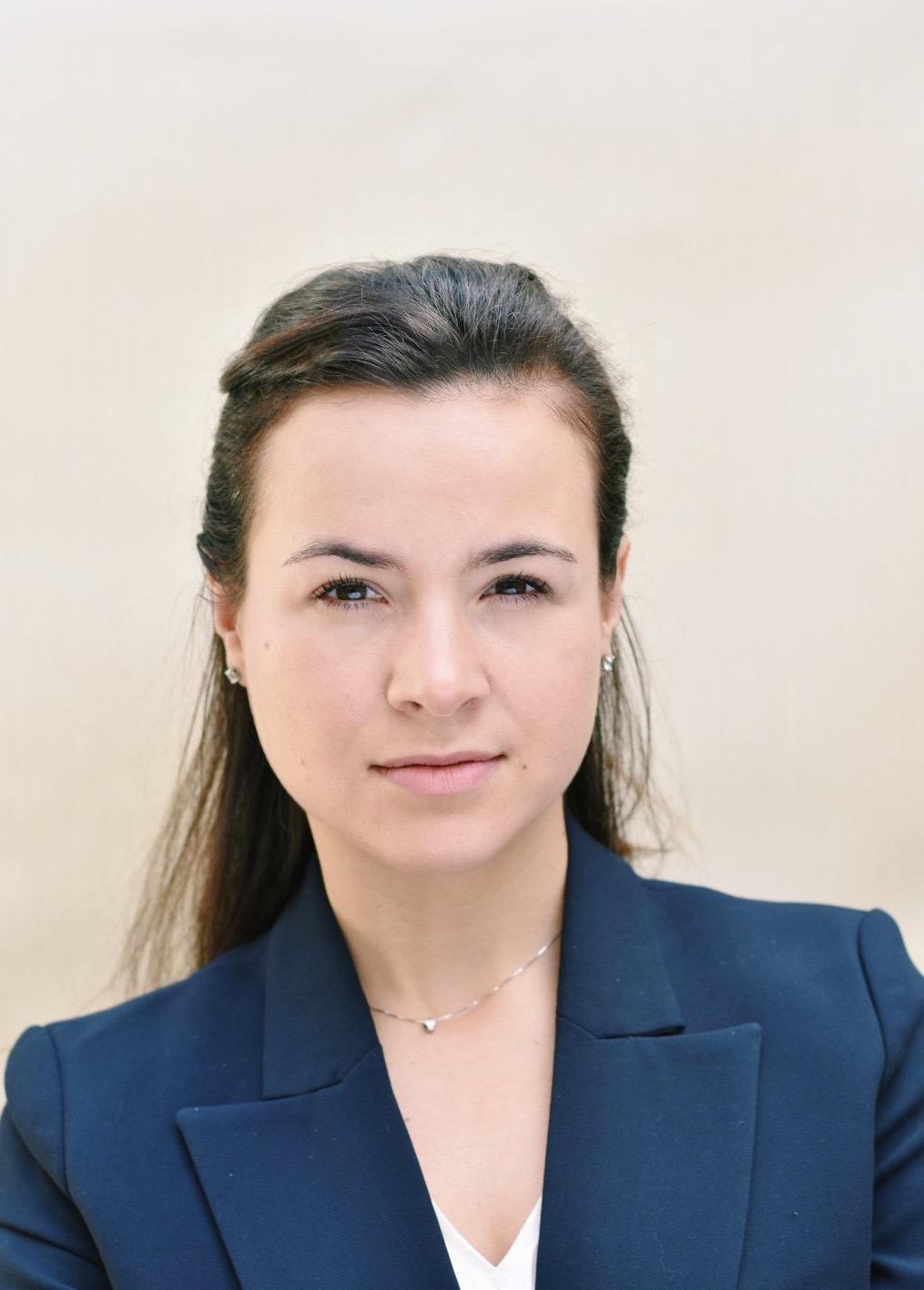
Mrs. Mercedes Aramendía is the president of the Uruguayan Regulatory Unit of Communication Services (URSEC).
She is a lawyer from the University of Montevideo, Uruguay. She has a Master in Administrative - Economic Law from the same University, and an MBA from Camilo José Cela University - EAE Business School, Madrid, Spain. She also has a degree in Law and a Master´s Degree in Access to the Legal Profession from the Antonio de Nebrija University, Spain. She has an LLM in Law, Technology and Entrepreneurship from Cornell Law School, Cornell Tech, United States of America.
She has broad experience in the telecommunications sector, collaborating with different organizations. Also, she is the Director of the Postgraduate Course named “Digital Transformation and the Law” at the University of Montevideo and is a Professor at the same University.
She has been the coordinator and co-author of two books published in Uruguay related to telecommunications, and has written several articles related to digital rights. Before being nominated as President of the Board of the URSEC, she has been running the Company name “Mercedes Aramendía” since 2018, from where she worked and collaborated with various telecommunication, technology, and entrepreneurship organizations. Before 2018, she worked as the Head of Institutional Relations and Regulation at Telefónica Móviles of Uruguay, as the Lawyer of the Chamber of Telecommunications in Uruguay, and in KPMG Uruguay.
In 2019, she was recognized by URSEC as one of the outstanding Uruguayan women in regulation and / or communications.
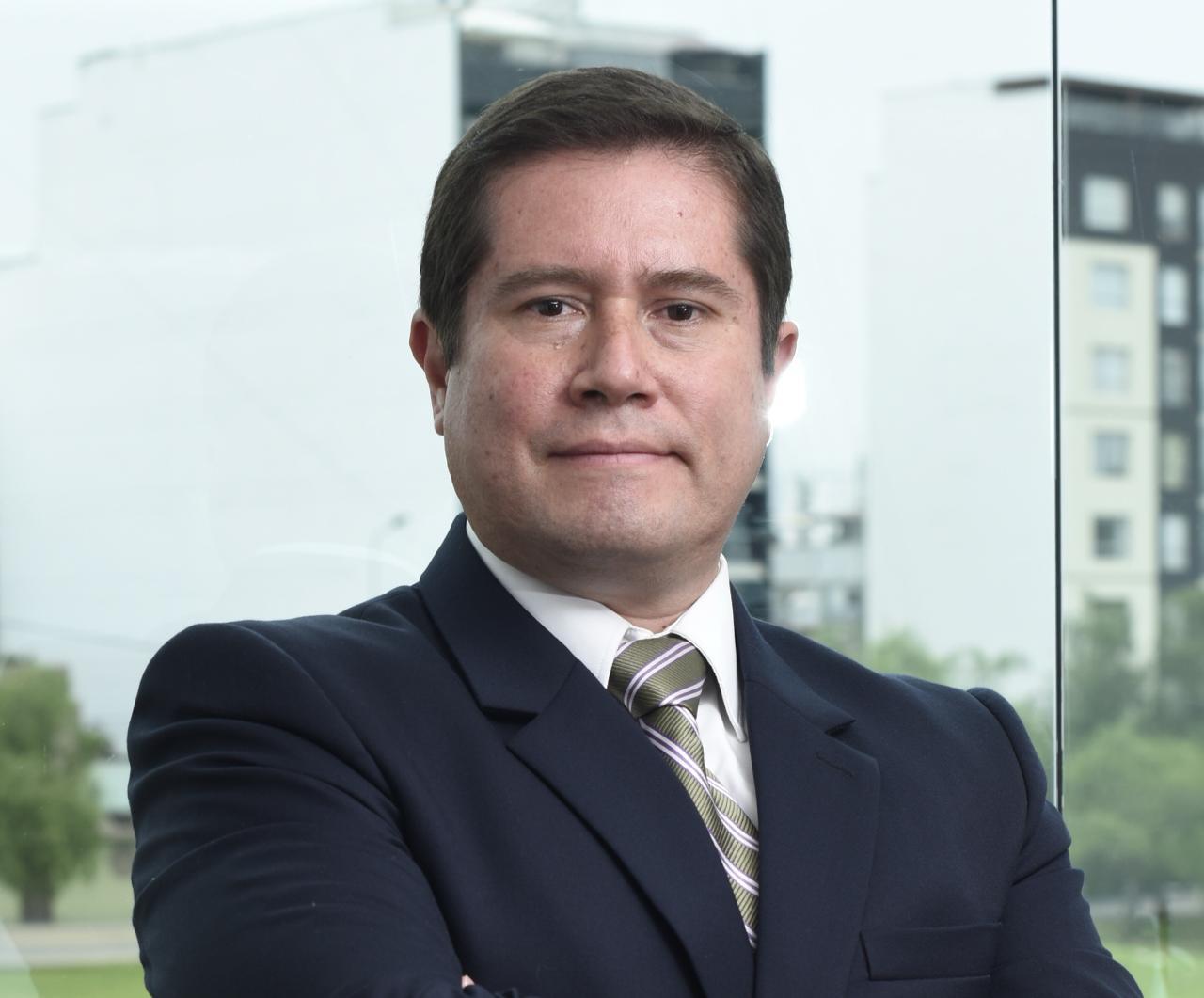
Manager of Supervision and Enforcement Directorate at OSIPTEL, the peruvian public telecommunications services regulator and competition agency. Luis holds a MS. in Telecommunications and MEng in Engineering Management, both from the University of Colorado at Boulder, and a BS in Electronic Engineering from the Pontifical Catholic University of PERU (PUCP), where he is Professor at the Telecommunications Engineering and Regulation of Public Services Graduate programs at PUCP. Luis is Senior Member of IEEE.
Luis is also member of the Consumer Protection Commission at the National Institute for the Defense of Competition and the Protection of Intellectual Property - INDECOPI.

Kate believes that digital technology products, new technology policies and updated business model practices are required to make transformative change in the lives of the under-served and decrease the growing digital divide. Kate joined DIAL in February, 2016 as its CEO to fulfill this vision. She has committed the past 26 years to bringing diverse stakeholders together to find common ground in business, technology, and policy, holding leadership roles in both the corporate and non-profit sector.
Prior to DIAL, Kate co-founded and led the Digital Health Solutions Group at PATH, the Seattle-based international health organization driving transformative innovation to save lives. During her eight years at PATH, Kate designed and led several global projects, working in both Africa and Asia, most notably those including the use of digital technology to improve the delivery of immunization services and health information systems for universal health coverage. Prior to PATH, Kate held diverse senior roles in the commercial software sector and international trade. At Microsoft, Intel, and General Electric, Kate held roles in ICT product development and launch, strategic planning, and business development, including launching Xbox Live in Europe and leading deal negotiations with telecom providers in 25 markets worldwide. In the non-profit sector, Kate led policy efforts as the President of the Washington Council on International Trade and the Director for Indonesia Affairs at the U.S. ASEAN Council. At both organizations, she partnered closely with U.S. corporations and government partners to strike mutually beneficial international trade agreements and expand market access for small and medium size enterprises.
-
 C1. The role of governments and all stakeholders in the promotion of ICTs for development
C1. The role of governments and all stakeholders in the promotion of ICTs for development
-
 C2. Information and communication infrastructure
C2. Information and communication infrastructure
-
 C3. Access to information and knowledge
C3. Access to information and knowledge
-
 C4. Capacity building
C4. Capacity building
-
 C5. Building confidence and security in use of ICTs
C5. Building confidence and security in use of ICTs
-
 C6. Enabling environment
C6. Enabling environment
-
 C7. ICT applications: benefits in all aspects of life — E-government
C7. ICT applications: benefits in all aspects of life — E-government
-
 C7. ICT applications: benefits in all aspects of life — E-business
C7. ICT applications: benefits in all aspects of life — E-business
-
 C7. ICT applications: benefits in all aspects of life — E-learning
C7. ICT applications: benefits in all aspects of life — E-learning
-
 C7. ICT applications: benefits in all aspects of life — E-health
C7. ICT applications: benefits in all aspects of life — E-health
-
 C7. ICT applications: benefits in all aspects of life — E-employment
C7. ICT applications: benefits in all aspects of life — E-employment
-
 C7. ICT applications: benefits in all aspects of life — E-environment
C7. ICT applications: benefits in all aspects of life — E-environment
-
 C7. ICT applications: benefits in all aspects of life — E-agriculture
C7. ICT applications: benefits in all aspects of life — E-agriculture
-
 C7. ICT applications: benefits in all aspects of life — E-science
C7. ICT applications: benefits in all aspects of life — E-science
-
 C8. Cultural diversity and identity, linguistic diversity and local content
C8. Cultural diversity and identity, linguistic diversity and local content
-
 C9. Media
C9. Media
-
 C10. Ethical dimensions of the Information Society
C10. Ethical dimensions of the Information Society
-
 C11. International and regional cooperation
C11. International and regional cooperation
-
 Goal 1: End poverty in all its forms everywhere
Goal 1: End poverty in all its forms everywhere
-
 Goal 2: End hunger, achieve food security and improved nutrition and promote sustainable agriculture
Goal 2: End hunger, achieve food security and improved nutrition and promote sustainable agriculture
-
 Goal 3: Ensure healthy lives and promote well-being for all
Goal 3: Ensure healthy lives and promote well-being for all
-
 Goal 4: Ensure inclusive and equitable quality education and promote lifelong learning opportunities for all
Goal 4: Ensure inclusive and equitable quality education and promote lifelong learning opportunities for all
-
 Goal 5: Achieve gender equality and empower all women and girls
Goal 5: Achieve gender equality and empower all women and girls
-
 Goal 6: Ensure access to water and sanitation for all
Goal 6: Ensure access to water and sanitation for all
-
 Goal 7: Ensure access to affordable, reliable, sustainable and modern energy for all
Goal 7: Ensure access to affordable, reliable, sustainable and modern energy for all
-
 Goal 8: Promote inclusive and sustainable economic growth, employment and decent work for all
Goal 8: Promote inclusive and sustainable economic growth, employment and decent work for all
-
 Goal 9: Build resilient infrastructure, promote sustainable industrialization and foster innovation
Goal 9: Build resilient infrastructure, promote sustainable industrialization and foster innovation
-
 Goal 10: Reduce inequality within and among countries
Goal 10: Reduce inequality within and among countries
-
 Goal 11: Make cities inclusive, safe, resilient and sustainable
Goal 11: Make cities inclusive, safe, resilient and sustainable
-
 Goal 12: Ensure sustainable consumption and production patterns
Goal 12: Ensure sustainable consumption and production patterns
-
 Goal 13: Take urgent action to combat climate change and its impacts
Goal 13: Take urgent action to combat climate change and its impacts
-
 Goal 14: Conserve and sustainably use the oceans, seas and marine resources
Goal 14: Conserve and sustainably use the oceans, seas and marine resources
-
 Goal 15: Sustainably manage forests, combat desertification, halt and reverse land degradation, halt biodiversity loss
Goal 15: Sustainably manage forests, combat desertification, halt and reverse land degradation, halt biodiversity loss
-
 Goal 16: Promote just, peaceful and inclusive societies
Goal 16: Promote just, peaceful and inclusive societies
-
 Goal 17: Revitalize the global partnership for sustainable development
Goal 17: Revitalize the global partnership for sustainable development
